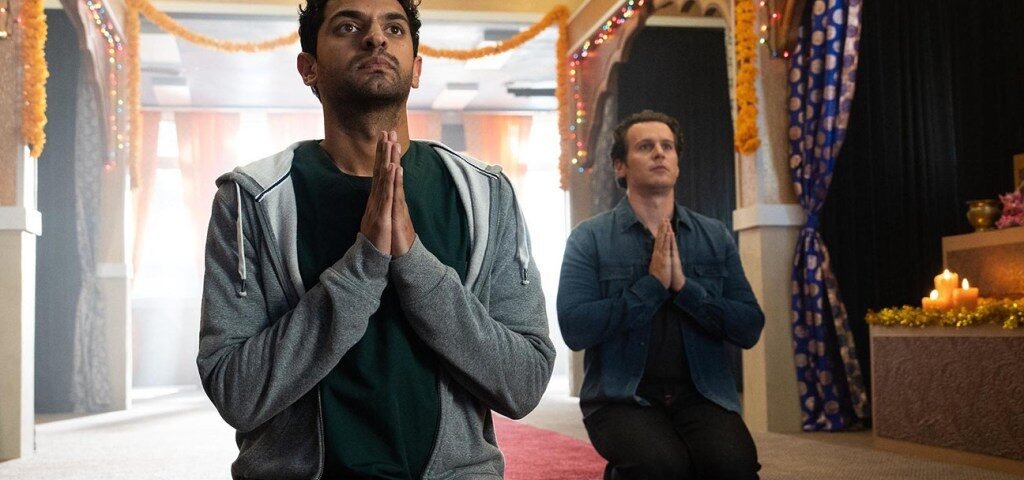


‘Songs From the Hole’ Review: A Poetic Approach Elevates a Familiar Justice System Doc
March 22, 2024


‘Arcadian’ Review: Nicolas Cage Headlines a Post-Apocalyptic Drama That Rarely Lives Up to Its Potential
March 23, 2024After getting engaged to a white photographer raised by Indian parents, an Indian American doctor faces the challenge of introducing him to his traditional family.
A Nice Indian Boy
A modest charmer.
Walking out of the theater after DDLJ, Jay (Jonathan Groff) launches into a defense of the over-the-top emotionality of Bollywood romances. “I think we’re all embarrassed by the bigness of love,” he declares. His date, Naveen (Karan Soni), is intrigued but skeptical, later recounting the interaction to his work bestie (Peter S. Kim) as a bit weird and kind of corny.
A Nice Indian Boy gets the boy-meets-boy portion of its storyline squared away early. Naveen is a shy Indian American doctor who spends his lonely evenings recording (and usually deleting) messages to former flings like “Guess you’ve been eating an apple a day because you’ve kept this doctor away!” Photographer Jay is more confident and open, a former foster kid whose story got a happy ending when he was adopted by Indian parents. The two start dating after a chance meeting at a Hindu temple, and by the end of the second of the narrative’s five acts, they’re engaged. If that sounds rushed, it is — the bulk of the relationship flies by in a montage covering some unspecified period of time. And throughout, the film’s focus on Naveen cannot help but shortchange Jay, often leaving him as an ideal for Naveen to catch up to rather than a protagonist in his own right.
The relationship between Naveen and Jay needs to be as strong as it is, because A Nice Indian Boy‘s true will-they-won’t-they lies between Jay, who has no family of his own, and Naveen’s family, who don’t quite know what to make of this “white orphan artist.” Although Naveen’s been out to his family for years, they haven’t, as he puts it, “ever actually seen me be gay.” His mother, Megha (Zarna Garg), will call him at work to recount the entire plot of Milk in a misguided effort to connect, but neither she nor father Archit (Harish Patel) dare ask about Naveen’s personal life — to the irritation of Naveen’s married sister Arundhathi (Sunita Mani), who gets nothing but invasive questions about whether she’s pregnant yet. For his part, Naveen offers them no details about dating either. He’s certainly never brought home a boyfriend, until his engagement to Jay forces the issue.
Jay’s chaotic first visit to the Gavaskar home is A Nice Indian Boy‘s comedy at its liveliest, bolstered by Soni’s gift for leaning into awkwardness. Naveen’s family veers between trying way too hard to seem accepting, and struggling to contain their surprise and skepticism about Jay. In one moment they’re turning on For the Love of DILFs while brightly announcing, “We watch this gay TV for you.” In another, they’re muttering in Hindi about how Jay’s career as a freelance photographer is probably just American for “unemployed,” before Naven is able to clarify that Jay understands Hindi fluently. (Elsewhere, Kim’s Paul is another reliable source of laughs, rattling off the new rules of gay dating or a harrowing anecdote about getting mugged with the same playful nonchalance.)
But beneath A Nice Indian Boy‘s Meet the Parents-style gags course real fear and hurt. “He didn’t tell his family about me, so it’s like I don’t exist,” Jay complains to friends after an early fight. The way Naveen finally does introduce Jay seems hardly better, however: Terrified of disappointing his parents, Naveen instructs Jay to be a “more formal” version of himself and rushes to downplay Jay’s vape habit or make his queer-centric art sound more “mainstream,” which in turn makes Jay feel rejected.
And yet, beneath those lie a foundation of real love, as manifested in a million ways big and small. It can make itself known in gestures as tiny as Archit bringing Megha a hot water bottle on a chilly evening, or Archit incorporating Jay’s suggestions into his trusty korma recipe, or Naveen and Arundhathi commiserating over coffee the morning after a bitter fight. It flows from friends who drag a guy out on the town when he needs to recover from heartbreak, or from relatives who show up prepared to celebrate someone else’s union even as they deal with romantic disappointments of their own.
And, of course, it can shine through in a burst of song or a razzle-dazzle dance number. A Nice Indian Boy might not capture how epic love can be, exactly — it’s too grounded and scrappy for the sorts of over-the-top displays that Jay so admires in the movies. But it gets something of how full it can make life feel.





